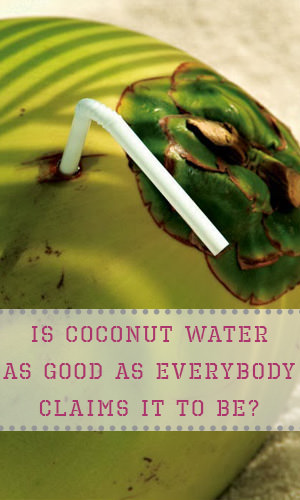
Is Coconut Water As Good As Everybody Claims It To Be?
Posted on 29 Feb, 2020
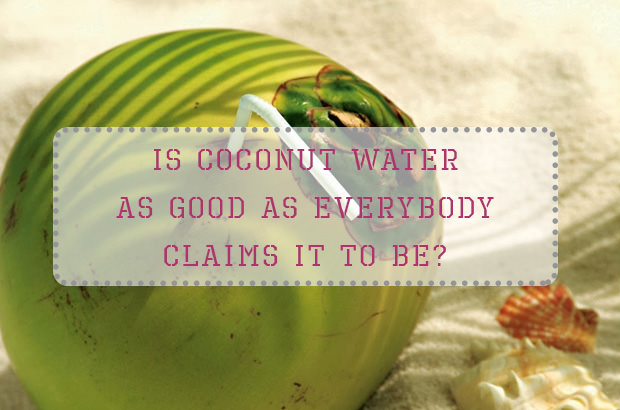
Dubbed "Mother Nature’s sports drink" by marketers and propelled by celebrity and athlete endorsements, the demand for coconut water is sky rocketing. Does it deserved to be bestowed its superfood status. We put coconut water under the spotlight.
 What Is Coconut Water?
What Is Coconut Water?
Naturally refreshing, coconut water has a sweet, nutty taste. It contains easily digested carbohydrate in the form of sugar and electrolytes. Not to be confused with high-fat coconut milk or oil, coconut water is a clear liquid in the fruit’s center that is tapped from young, green coconuts.
It has fewer calories, less sodium, and more potassium than a sports drink. Ounce per ounce, most unflavored coconut water contains 5.45 calories, 1.3 grams sugar, 61 milligrams (mg) of potassium, and 5.45 mg of sodium compared to Gatorade, which has 6.25 calories, 1.75 grams of sugar, 3.75 mg of potassium, and 13.75 mg of sodium.
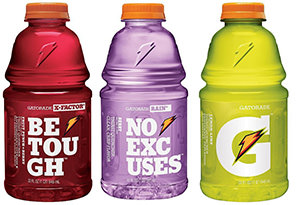 Better Than Some Sugary Drinks
Better Than Some Sugary Drinks
When you need topping up with fluids and electrolytes, coconut water fits the bill. Coconut water has less sugar than many sports drinks and much less sugar than sodas and some fruit juices. Plain coconut water could be a better choice for adults and kids looking for a beverage that is less sweet. But don’t overdo it. One 11-ounce container has 60 calories and if you drink several in one day, the calories can add up quickly.
Nutritional Breakdown
- Its liquid is packed with simple sugars, electrolytes, and minerals to replenish dehydration conditions inside the human body.
- Research studies suggest that cytokinins (e.g., kinetin and trans-zeatin) in coconut water found to have significant anti-ageing, anti-carcinogenic, and anti-thrombotic (anti-clot formation) effects.
- Coconut water has been generally offered to patients with diarrhea in many tropic regions to replace the fluid loss from the gastrointestinal tract and to reduce the need for hospitalisation.
- Coconut water is composed of many naturally occurring bioactive enzymes such as acid phosphatase, catalase, dehydrogenase, diastase, peroxidase, RNA-polymerases etc. In effect, these enzymes help in the digestion and metabolism.
- Despite being very light in consistency, its water proportionately has better composition of minerals like calcium, iron, manganese, magnesium, and zinc than some of the fruit juices like oranges. (Compare the mineral composition of oranges).
- Its liquid is also a very good source of B-complex vitamins such as riboflavin, niacin, thiamin, pyridoxine, and folates. These vitamins are essential in the sense that the human body requires them from external sources to replenish.
Some Athletes Swear By It
Professional tennis player John Isner credits coconut water with keeping him on his feet for his epic 11-hour marathon Wimbledon tennis win. “It is super hydrating and has kept me going in long matches and prevented me from cramping even in the hottest and most humid conditions,” Isner says.
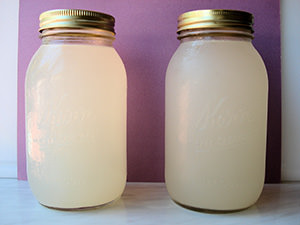 He drinks a mixture of coconut water and water the night before a match in difficult heat conditions and routinely mixes a cocktail of coconut water and sea salt for on-court hydration. He mixes it with protein powder for post-match recovery.
He drinks a mixture of coconut water and water the night before a match in difficult heat conditions and routinely mixes a cocktail of coconut water and sea salt for on-court hydration. He mixes it with protein powder for post-match recovery.
A study recently published in Medicine & Science in Sports & Exercise shows that coconut water replenishes body fluids as well as a sports drink and better than water, but the athletes preferred the taste of the sports drinks.
A 2007 study shows coconut water enhanced with sodium was as good as drinking a commercial sports drink for post-exercise rehydration with better fluid tolerance. Another study reported that coconut water caused less nausea, fullness, and stomach upset and was easier to consume in large amounts during rehydration.
 What Experts Say
What Experts Say
Staying hydrated is one of the most important things for recreational and professional athletes. And if the taste of coconut water helps you drink plenty of fluids, it is a fine choice for most people but may not be for those in prolonged physical activity.
The challenge is when you exercise strenuously for more than three hours in the heat and lose lots of body fluids, you need easily absorbed carbs for quick energy and to replace lost electrolytes like sodium and potassium. Neither coconut water nor sports drinks contain enough sodium or carbs for the heavy perspirer. So it is best to supplement with a quick source of energy like a banana, some raisins or a handful of pretzels.
Bottom Line
There are some health benefits to consuming coconut water. It’s an all-natural way to hydrate, reduce sodium, and add potassium to diets. Most Americans don’t get enough potassium in their diets because they don’t eat enough fruits, vegetables, or dairy, so coconut water can help fill in the nutritional gaps.
Beyond that, the scientific literature does not support the hype that it will help with a laundry list of diseases. There is a lot of hype about coconut water, yet the research is just not there to support many of the claims and much more research is needed.
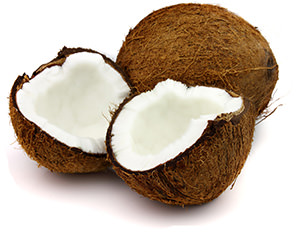 While it is questionable whether the average exerciser (someone who exercises for an hour or less 3-4 times a week), actually needs fluid other than water to help recover from exercise, coconut water is certainly a better alternative than many of the high calorie and higher protein options that are promoted.
While it is questionable whether the average exerciser (someone who exercises for an hour or less 3-4 times a week), actually needs fluid other than water to help recover from exercise, coconut water is certainly a better alternative than many of the high calorie and higher protein options that are promoted.
Superfood Books We Like

by David Wolfe

by Robin Jeep

by Jonny Bowden

by Kasia Roberts

 Common Food Labels And What They Mean
Common Food Labels And What They Mean Dangerous Foods That Are Actually Good For You
Dangerous Foods That Are Actually Good For You Proper Posture
Proper Posture 8 Great Ways To Prepare Eggs
8 Great Ways To Prepare Eggs










